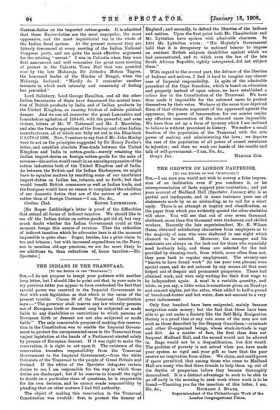THE GROWTH OF LONDON PAUPERISM.
LTO VIE EDITOR OF TRB '`SPROTATOR."]
SIR,—I am sure you would not wish to convey a false impres- sion of an institution even if you condemn it, or let misrepresentation of facts support your contention ; and yet your account of Medland Hall (Spectator, January 4th) is so partial and inadequate, and in some instances your use of statements made by us so misleading, as to call for a short reply. There is an attempt at inquiry and classification, as the paper from which you evidently quoted the other statistics will show. You will see that out of over seven thousand sheltered, more than five thousand were tradesmen and skilled workers. Recently the late superintendent, Mr. E. Wilson Gates, obtained satisfactory characters from employers as to the majority of men who were sheltered in one night which chanced to be selected. Moreover, the manager and his assistants are always on the look-out for those who especially need brotherly help, and these are selected for the test provided by cleaning-work, from which, more often than not, they pass back to regular employment. The seventy-one "known to have found work" (to use your own phrase) were special cases, and do not exhaust by any means all that were helped out of despair and permanent pauperism. These had obtained work, and were only waiting for their first wage to be independent again. A meal is a variable quantity, and while, as you say, a little extra is sometimes given on Sundays and concert nights, yet the extra, when added to half-a-pound of bread-and-butter and hot water, does not amount to a very great inducement.
Only four hundred have been emigrated, mainly because emigration costs money; but the fact that these have been able to go out under a Society like the Self-Help Emigration Society is a proof that at any rate some of the men are not such as those described by the Stepney Guardians,—criminals and other ill-organised beings, whose stock-in-trade is rags and dirt. As a matter of fact, the first class does not frequent Medland Hall, and the second would not be allowed in. Rags would not be a disqualification, but dirt would. The problem of poverty is not solved when you have made your system so rigid and your gift so bare that the poor receive no inspiration from either. We claim, and could prove if space permitted, that among those who come to Medland Hall are many who find there friends to help them up out of the depths of pauperism before they become thoroughly demoralised. It is a distinct advantage to such to be able to go off early in the morning to seek work where work is to be found.—Thanking you for the insertion of this letter, I am, Superintendent of the Philanthropic Work of the London Congregational Union.






































 Previous page
Previous page